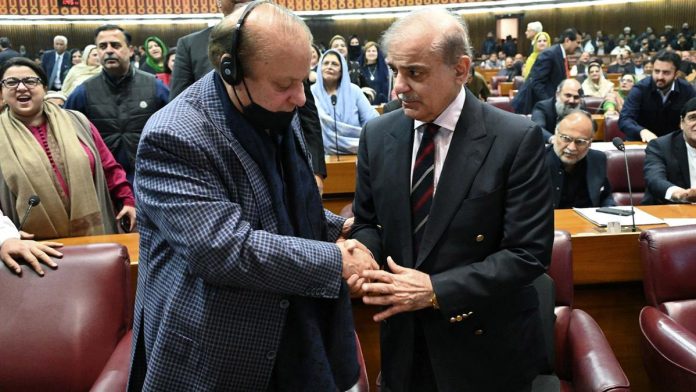ISLAMABAD, Mar 4: Shehbaz Sharif on March 4 took the oath as Prime Minister of Pakistan, taking over the country’s reins for a second time since 2022, amidst staggering economic and security challenges.
President Arif Alvi administered the oath to the 72-year-old Mr. Shehbaz in a ceremony held at the Aiwan-i-Sadr, the presidential palace.
The ceremony was attended by the three services chiefs, senior officials, diplomats, leading business people, members of the civil society and media organisations. The caretaker premier Anwaarul Haq Kakar was also present.
The brief ceremony began with the recitation of the Holy Quran, followed by the oath-taking.
The ceremony was attended by former Prime Minister Nawaz Sharif, Punjab Chief Minister Maryam Nawaz and other PML-N workers and Sindh chief minister Murad Ali Shah was also present on the occasion.
Mr. Shehbaz earlier served as Prime Minister of a coalition government from April 2022 to August 2023 before Parliament was dissolved to hold general elections last month.
Mr. Alvi had in 2022 tacitly refused to give oath to Shehbaz by saying that he was not feeling well when he was elected as premier for the first time after ousting Imran Khan through a vote of no confidence. Then Senate Chairman Sadiq Sanjrani administered the oath to him.
It was speculated that Alvi may once again skip the official duty but he agreed.
The oath-taking ceremony comes days after the Pakistan Muslim League-Nawaz and the Pakistan Peoples Party agreed on a power-sharing deal to form a coalition government.
On Sunday, Mr. Shehbaz comfortably won a majority in the newly-elected Parliament amidst sloganeering by the Opposition.
Mr. Shehbaz, the consensus candidate of the PML-N and the PPP, received 201 votes in the 336-member Parliament. His challenger Omar Ayub Khan of jailed former prime minister Imran Khan’s Pakistan Tehreek-e-Insaf (PTI) secured 92 votes.
In the February 8 polls, marred by allegations of vote rigging, the Sharifs-led party failed to garner a clear majority, albeit technically, it is the largest party with 75 out of the 265 contested seats.
Mr. Shehbaz, known to be an astute politician and a good administrator, was tasked by his elder brother and former three-time prime minister to negotiate with other like-minded parties on the formation of a coalition government.
Besides the PPP, Mr. Shehbaz was backed by the Muttahida Qaumi Movement (MQM-P), Pakistan Muslim League (Q), Balochistan Awami Party, Pakistan Muslim League (Z), Istehkam-e-Pakistan Party and the National Party.
The new leader should make difficult decisions to undertake to reform the economy of the cash-strapped country and administration.
In his first speech after being voted in, Mr. Shehbaz spoke about the struggling economy and said it would require reforms to rid the country of financial difficulties.
He should also mend ties with its neighbours for peace and stability.
He also faces challenges from Mr. Khan’s party which has promised to keep protesting the alleged manipulation of the February 8 election results.
The security situation of the country has also deteriorated in recent months, with an increase in terror attacks by Pakistan Taliban and other terror groups.
Meanwhile, caretaker PM Kakar, according to reports, has vacated the Prime Minister House, but he will continue to perform his duties as premier till the issuance of notification of the new chief executive of the country. He has been allotted a house in the Minister’s Enclave.
During Mr. Shehbaz’s two successive tenures as chief minister of Punjab (2008-2013 and 2013-2018), a network of underpasses, overhead bridges and mass transit systems was introduced in the most populous Punjab province and was completed in record time.
Born in September 1951 in a Punjabi-speaking Kashmiri family in Lahore, Shehbaz did his graduation from the Government College University, Lahore.
His family emigrated from Anantnag in Kashmir for business and settled in the village of Jati Umra in Amritsar district, Punjab at the beginning of the 20th century before moving to Pakistan. (Agencies)
Trending Now
E-Paper


